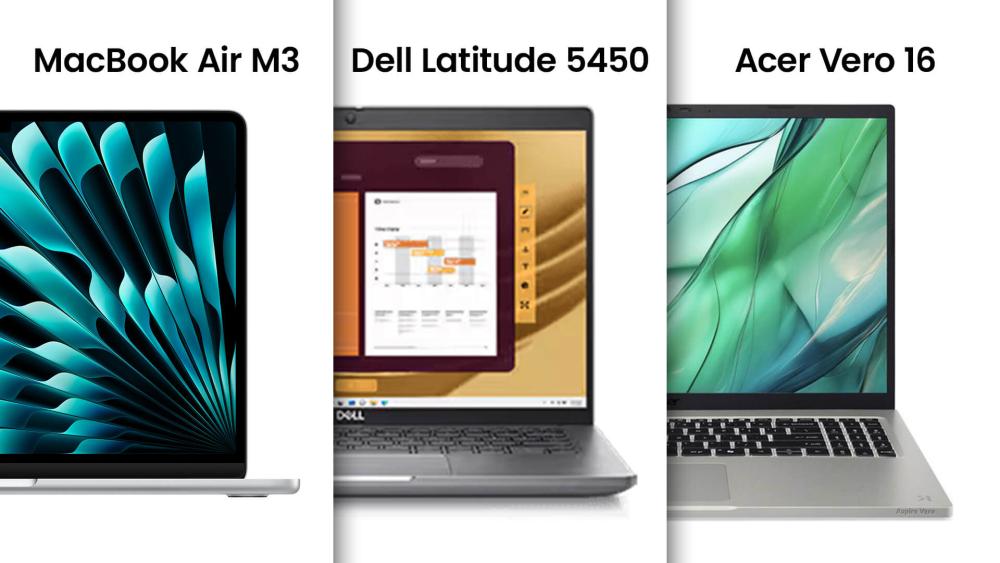POSTED: 10 November, 2025
Introducing Eco-Material Laptops: Designed for Sustainability
Sustainability is no longer just a buzzword in the tech industry; it has become a design priority. From recycled casings to carbon-neutral manufacturing, the eco-friendly laptops are redefining what "new" really means in 2025.
Across the UK, brands are moving towards greener design and energy-efficient builds that last longer, waste less, and leave a smaller mark on the planet. This new wave of eco-innovation laptops proves you do not have to trade performance for principles, as the future of computing is both powerful and planet-conscious.
What Makes a Laptop Truly Sustainable?
An eco-friendly laptop goes far beyond recycled plastic shells. It combines smart engineering, renewable materials, and responsible manufacturing to reduce waste from start to finish. The goal is simple: create a device that performs well, lasts longer, and has a lower environmental impact throughout its life.
Key sustainability factors include recycled or responsibly sourced materials, carbon-neutral production, and designs that allow easy repair or upgrade. Certifications such as Energy Star, EPEAT Gold, and TCO Certified are strong indicators that a laptop meets these green standards.
Today's eco-smart and energy-efficient laptops prove that you can enjoy impressive performance while helping protect the planet at the same time.

Eco Materials and Design Trends Transforming Laptop Design
The next generation of eco-friendly laptops is being crafted from smarter, cleaner materials that reduce waste and carbon footprint without compromising durability or style. Here's a look at the sustainable materials shaping this green tech movement.
Recycled Plastics (PCR)
Made from post-consumer waste such as bottles, these plastics are reused to create casings, keyboard frames, and internal structures. Brands like Dell and HP use PCR plastics across several models, proving that recycled does not mean flimsy.
Bioplastics
Sourced from renewable materials such as cornstarch, sugarcane, or even waste cooking oil, bioplastics offer a lower carbon footprint than petroleum-based plastics. HP has already used bioplastics derived from used cooking oil in select devices.
Recycled Aluminium and Magnesium
Tough, lightweight, and endlessly recyclable, these metals are ideal for chassis and outer shells. Apple's MacBook Air features 100% recycled aluminium enclosures, setting a high bar for sustainable craftsmanship.
Natural Fibre Composites
Materials such as bamboo, flax, and hemp are blended with resins to form strong yet biodegradable components. Lenovo's ThinkPad Z13 Gen 2 uses a flax-fibre lid cover, giving a premium look with a smaller environmental footprint.
Recycled Rare Earth Elements
Essential for speakers, trackpads, and storage drives, rare earth elements are difficult to source responsibly. Apple leads the way by using recycled rare earths in its devices, helping to reduce mining waste and energy use.
Eco-Friendly Packaging
Sustainable packaging is now a core part of design. Acer and HP use bamboo, recycled cardboard, and soy-based inks to create fully recyclable boxes and inserts that protect your device without harming the planet.
Modular and Repairable Design
Framework laptops are built with longevity in mind. Their modular, repairable builds use screws instead of glue, making upgrades and repairs straightforward. This eco-engineered laptop approach cuts e-waste and extends product life, making it a win for users and the environment alike.
Leading the Charge: Brands Setting the Green Standard
Major tech brands are stepping up their sustainability game, proving that an eco-friendly laptop can be just as sleek, fast, and capable as any traditional machine. Each company has taken a unique approach to reduce waste, improve recyclability, and design with purpose.
Apple
Apple has long led the industry with its use of 100% recycled aluminium and recycled rare earth elements in its devices. The brand's ongoing commitment to carbon-neutral manufacturing has made the MacBook Air a benchmark for green design. In the current lineup, the Apple MacBook Air M3 is a machine that comes with recycled components and eco-certified packaging.
HP
HP continues to push boundaries with bioplastics, recycled plastics, and packaging made from renewable materials. The brand's eco-smart laptops are designed for both performance and low environmental impact. Many HP laptops, like the Elite Dragonfly, perfectly fall under the category of environmentally friendly laptops.
Dell
Dell uses ocean-bound plastics and closed-loop aluminium in its laptops, while also developing modular ports that simplify repair. This focus on circular design helps reduce waste and makes its devices easier to maintain. Dell Latitude 5450 is an excellent option if you are looking for a green laptop that takes care of the environment along with your daily productivity needs.
Framework
Framework is changing the game with modular laptops built for easy repairs, upgrades, and part replacement. Its approach demonstrates that longevity is a key part of sustainability.
Acer
Acer's Vero Series sets an example for accessible green computing, using high percentages of post-consumer recycled plastic and achieving key eco certifications. Vero 16 is a perfect example of a laptop with recycled chassis. In addition to the Vero series, there are numerous Acer laptops that comply with the modern sustainability standards.
ASUS
ASUS has adopted recycled metals and FSC-certified packaging in its Asus ZenBook laptop range, reinforcing that premium design and sustainability can go hand in hand.

Sustainable Models Arriving (and Available) in the UK
A growing number of laptops built with recycled and renewable materials are now available across the UK. These devices balance performance with environmental responsibility, offering practical examples of what sustainable design looks like in action.
| Device | Key Sustainable Features | UK Status |
| Acer Aspire Vero 16 | Chassis made from over 70% recycled plastic and bio-based oyster shell material, ocean-bound plastic touchpad, 100% recyclable packaging | Launched |
| Lenovo ThinkPad Z13 Gen 2 (Flax Fibre) | Bio-based flax-fibre lid cover, recycled aluminium, high recycled-plastic content | Available in business channels |
| Dell Latitude 5450 | Bio-based plastics, recycled materials, modular USB-C ports for easier repair | Available |
| Framework Laptop 13 / 16 | Modular and repairable design with user-replaceable components, high recycled material use | Ships to the UK |
| Acer Chromebook Vero 514 | 30–50% post-consumer recycled plastics, ocean-bound plastic touchpad | Available |
| HP Elite Dragonfly G4 | Recycled magnesium enclosure, ocean-bound plastics, recycled packaging | Available |
| ASUS Zenbook S 13 OLED (2024) | Recycled metals, post-consumer recycled plastics, FSC-certified packaging | Available |
| Apple MacBook Air (M3) | 100% recycled aluminium enclosure, recycled components, eco-certified packaging | Available |
These models highlight how the eco-friendly laptop market is evolving, with more carbon-neutral and low-carbon laptops becoming accessible to UK users who value sustainability without sacrificing performance.
Why an Eco-Friendly Laptop Is Worth It
Choosing an eco-friendly laptop is not just a nod to sustainability; it is a smart long-term decision. These devices are built to last, easier to repair, and often more efficient to run. With recycled materials, modular parts, and energy-saving components, they reduce both waste and running costs over time.
For users, the benefits go beyond lower electricity bills. A carbon-neutral laptop helps cut your personal carbon footprint, while supporting companies that invest in ethical production and green innovation. In short, you get a dependable, high-performance machine that does its bit for the planet too.
As the UK moves towards cleaner, greener technology, investing in environmentally friendly laptops and low-carbon laptops is a small but meaningful way to join the movement for a more sustainable digital future.

The Future of Eco-Tech in the UK
The future of computing is looking cleaner, smarter, and far more sustainable. Tech manufacturers are doubling down on recyclable materials, renewable energy use, and modular designs that extend a laptop's life rather than shorten it. Upcoming eco-engineered laptops are expected to use even more bio-based materials, advanced recycling methods, and energy-efficient components that help lower emissions across their production cycle.
This shift is not limited to laptops. Even displays like the Asus ProArt Monitor are being designed with recycled metals and eco-conscious manufacturing. There are numerous eco-friendly monitors available in the market that offer the best of both worlds: performance and a low environmental footprint. Similarly, devices such as the Galaxy Book are adopting greener materials and packaging, showing how sustainability is spreading across the wider tech ecosystem. Moreover, eco-friendly printers are also helping people cut their carbon footprint. In short, there is a full range of eco-friendly tech designed to minimise environmental impact without compromising on performance.
As the UK market embraces these innovations, green tech laptops will play a central role in balancing performance with responsibility, helping both individuals and businesses reduce their digital carbon footprint without compromising on quality or capability.
Final Thoughts
The rise of the eco-friendly laptop marks a real turning point in how we think about technology. It proves that powerful performance and sustainable design can work hand in hand, giving users the best of both worlds. These new devices are lighter on resources, built to last, and crafted with materials that respect the planet.
As more UK consumers choose eco-smart laptops and energy-efficient laptops, the message to manufacturers is clear: sustainability is no longer optional. It is the standard for the next generation of computing.
For those ready to make a greener choice, the latest range of sustainable devices can be found through Box's eco-friendly tech collection, where innovation meets responsibility.
Frequently Asked Questions
What defines an eco-friendly laptop?
An eco-friendly laptop is designed with sustainability in mind, using recycled or renewable materials, energy-efficient components, and eco-certified manufacturing processes that reduce waste and carbon emissions.
Are eco laptops as durable as standard models?
Yes. In many cases, they are even stronger. Recycled aluminium and magnesium offer the same strength as virgin metals, while high-quality recycled plastics are engineered for durability and longevity.
How are bioplastics different from recycled plastics?
Bioplastics are made from renewable sources such as cornstarch or sugarcane, while recycled plastics are reprocessed from consumer waste. Both help cut reliance on new petroleum-based materials.
Do eco materials affect laptop performance?
Not at all. Modern eco-engineered laptops are designed to deliver the same processing power, speed, and battery life as traditional models, with the added benefit of sustainability.
Can I recycle my old laptop responsibly?
Yes. Many UK retailers and local councils offer e-waste recycling schemes. You can also donate or trade in old laptops through brand recycling programmes to ensure parts are reused or safely disposed of.